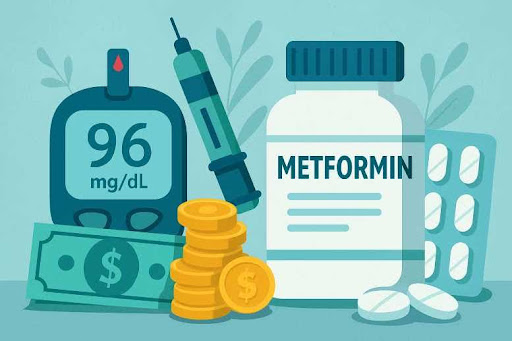Understanding Metformin Cost: What You Need to Know

In recent years, Metformin has gained attention not just for its primary role in managing type 2 diabetes, but also for its potential benefits in promoting longevity and reducing age-related diseases. As more people explore this medication for its broader applications, questions around Metformin cost have become increasingly common.
Understanding the pricing of Metformin involves examining several factors, including formulation, dosage, insurance coverage, and whether you’re purchasing the generic or brand-name version. For those seeking longevity-focused treatments, finding affordable and reliable sources becomes even more essential.
One reputable platform that provides clarity and access to longevity treatments is Longevity Direct. Their detailed breakdown of Metformin cost helps users make informed decisions about incorporating this drug into their health and wellness routines.
What is Metformin and Why Is It Popular?
Metformin is a first-line medication used primarily for treating type 2 diabetes. It helps regulate blood sugar levels by reducing the amount of glucose produced by the liver and increasing the sensitivity of muscle cells to insulin. However, recent studies and anecdotal evidence suggest that Metformin may also have anti-aging properties. This has sparked interest in the drug from individuals without diabetes who are seeking to enhance longevity, slow aging, and reduce the risk of chronic diseases like cancer and Alzheimer’s.
Given this growing demand, it’s not surprising that many are curious about the real cost of taking Metformin long-term—especially if it’s not being covered by traditional health insurance.
Factors That Influence the Cost of Metformin
1. Generic vs. Brand-Name
Metformin is available both as a brand-name drug (Glucophage being the most well-known) and as a generic version. Generic Metformin is significantly cheaper and just as effective. While brand-name formulations can cost hundreds of dollars per month, generic versions can be as low as $4 for a 30-day supply at major retail pharmacies.
2. Dosage and Formulation
Metformin is available in different dosages, typically ranging from 500 mg to 1000 mg. Extended-release (ER or XR) versions are usually more expensive than the immediate-release tablets due to their more complex manufacturing process. ER versions are often preferred by those who experience gastrointestinal side effects with the regular formulation.
3. Insurance Coverage
With health insurance, the out-of-pocket Metformin cost is usually very low—often under $10 per month. However, those without insurance, or those using it off-label for longevity purposes, might not get coverage at all. In these cases, it becomes important to shop around for the best prices or consider subscription-based services like Longevity Direct.
4. Pharmacy and Location
Prices for Metformin can vary widely depending on where you live and which pharmacy you choose. Some pharmacies offer discount programs, while others may charge significantly more for the same medication. Online platforms and telehealth services also play a role in shaping Metformin pricing and accessibility.
Metformin Cost Without Insurance
For those without insurance or those pursuing Metformin for off-label use (such as anti-aging), cost becomes a major factor in decision-making. On average, here’s what you might expect to pay:
- Generic Metformin IR (Immediate Release): $4–$15 for a 30-day supply
- Generic Metformin ER (Extended Release): $10–$50 for a 30-day supply
- Brand-Name Metformin (e.g., Glucophage XR): $150–$300+ for a 30-day supply
Some platforms provide monthly subscription models for longevity enthusiasts, offering a consistent and transparent price that includes medical evaluation, prescription, and delivery. Longevity Direct, for example, offers tailored longevity protocols that remove the guesswork and ensure high-quality medications delivered discreetly to your door.
Is It Worth Paying for Metformin Off-Label?
When used as part of a broader longevity strategy, many believe the potential benefits of Metformin justify the cost—especially when sourced affordably. Research suggests that Metformin may:
- Reduce oxidative stress and inflammation
- Mimic calorie restriction, activating pathways associated with longevity
- Lower the risk of cardiovascular disease and certain cancers
- Promote cellular health and mitochondrial function
However, long-term use should always be supervised by a healthcare provider, especially when taken outside of its FDA-approved indication.
Alternatives and Complementary Supplements
While Metformin is a promising part of many longevity protocols, it’s not the only option. In fact, some experts argue that a combined approach—incorporating lifestyle changes, regular exercise, and additional compounds—may offer better results than Metformin alone.
One such compound that’s gaining traction in the longevity space is Rapamycin. Originally developed as an immunosuppressant, Rapamycin has shown remarkable potential in extending lifespan and improving healthspan in animal models. Human trials are ongoing, but early adopters and researchers are optimistic about its potential.
If you’re exploring Metformin for its anti-aging benefits, it’s worth considering how it could fit into a larger protocol that includes other agents like rapamycin supplement. Rapamycin works through a different biological pathway (mTOR inhibition), offering a complementary mechanism to Metformin’s AMPK activation. Together, they could provide a more comprehensive approach to aging and disease prevention.
Where to Get Started
For those interested in longevity treatments, the decision to take Metformin or Rapamycin should come after careful consultation with medical professionals who understand both the science and the patient’s unique health profile. Reputable platforms such as Longevity Direct help streamline this process by providing direct access to doctors, medical guidance, and pharmaceutical-grade products.
Exploring options like Metformin and rapamycin supplement doesn’t have to be confusing or prohibitively expensive. With more services emerging in the longevity space, individuals now have the tools and resources to make informed choices about their health and future.
Final Thoughts
Metformin’s affordability—especially in its generic form—makes it an attractive option for both diabetes management and experimental longevity use. As interest in anti-aging medicine grows, more people are weighing the Metformin cost against its potential benefits. Whether you’re aiming to manage blood sugar levels or invest in long-term wellness, understanding the cost factors and available options is essential.
By leveraging trusted sources like Longevity Direct, individuals can explore safe and affordable pathways to incorporate Metformin into their health strategy. And when paired with innovative compounds like the rapamycin supplement, the future of healthy aging may be closer than we think.




